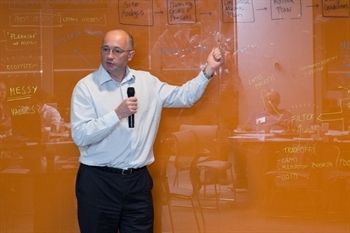
Ryan Griffin-Stegink
Frank Hebbert of Open Plans leads a discussion on software tools for civic engagement at the Urban Systems Collaborative
We shape our technology; thereafter it shapes us (to paraphrase an oft-abused Winston Churchill quote). We got a first-hand look at the relevance of technology to our work in 2011 when, with support from IBM, we sponsored a Placemaking apps contest within the larger Apps for Metro Chicago competition. It was a great year for open data: reams of information previously held close to the vest were being released at all levels of government, and citizen programmers were creating apps at a breakneck clip. Many of these apps had elements of Placemaking in that they helped people identify and learn about places that already exist. Our goal, though, was to use technology as a platform for interaction by equipping people with the tools to actually create places that matter to them. The winning app, Mi Parque, did just that in a big way, and it whet our appetite to think more broadly about the power of technology to democratize the planning process.
That’s right; rather than a dehumanizing effect, we saw with Mi Parque that technology can dramatically broaden both the breadth of people involved in a project, as well as the influence that they have. Not everyone can or will come to a two-hour community meeting on a given project, but countless more can and will contribute ideas and give feedback at all hours through the use of, say, an interactive smart phone app. Wouldn’t you rather help plan your community in your pajamas?

IBM's Pol MacAonghusa of Dublin
Photo by Ryan Griffin-Stegink
This initial experience with the power of technology got us thinking of further possibilities, such as how technology could connect people who might not otherwise recognize their mutual interest. This is why on April 19, MPC hosted a symposium of the Urban Systems Collaborative, a day-long gathering of urban planners, software designers, developers, architects, and community-level folks to discuss the information that feeds their work, where breakdowns in information flows are occurring, and where innovation could better assist them in connecting ideas. For example, an attendee that works with multiple community groups pointed out that the city’s foreclosure data is based on calls made to 311 to report a vacant building (the “squeaky wheels”). When a community group actually walked their streets of their particular neighborhood, they found the data hugely undercounted the scope of the problem. Why? Not every wheel squeaks on its own. How can technology help establish better information? In this case, it was suggested, perhaps citizens – in the form of mail carriers – outfitted with technology to report in real time could help solve the problem. As IBM's Bob Schloss pointed out, while officially captured data is nice, the most interesting data in a city is observable by regular people.
Capturing those observations by regular people is apparently catching on, through technology that enables innovative community engagement in public projects. For instance, Parsons Brinckerhoff’s Transform Metro Atlanta web site features an interactive project map that seeks feedback while educating residents about a penny sales tax increase to help alleviate Atlanta’s traffic gridlock. A web site and social media blitz on the Huey P. Long bridge widening project in New Orleans not only informs stakeholders of construction plans and progress, but also invites them on My Huey P to share personal stories about the bridge. MPC envisions similar platforms in Chicago, where technology-meets-community-engagement tools like Mi Parque are expanded to shape and guide a myriad of public projects.
We agree with Chicago’s Chief Technology Officer, John Tolva, who remarked at the Urban Systems Collaborative that data alone is not sufficient to address the needs of the city. If the city, as he stated, is a platform for interaction, then it is up to us to couple open data with increasingly sophisticated technology that can point us to a more accurate understanding of what the city’s residents want and need. After all, as IBM’s Pol MacAonghusa stated, “we are not designing computer systems. We are helping people to better live their lives.”